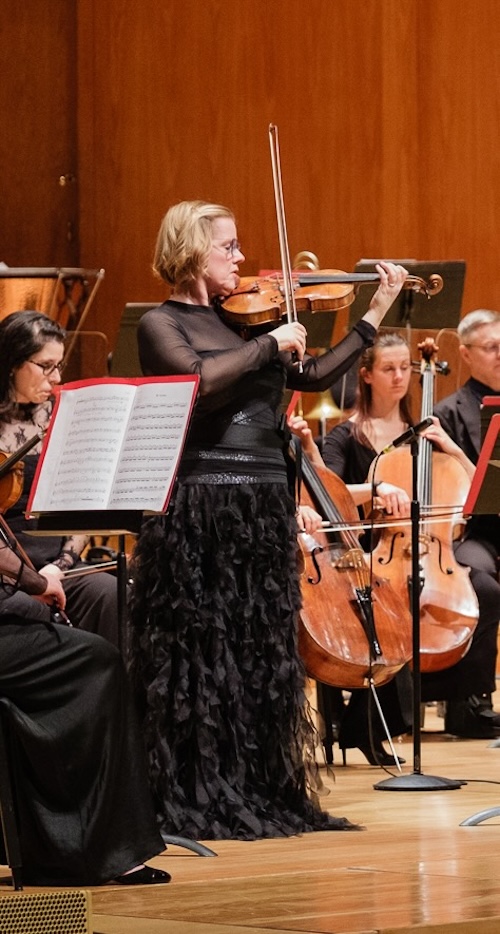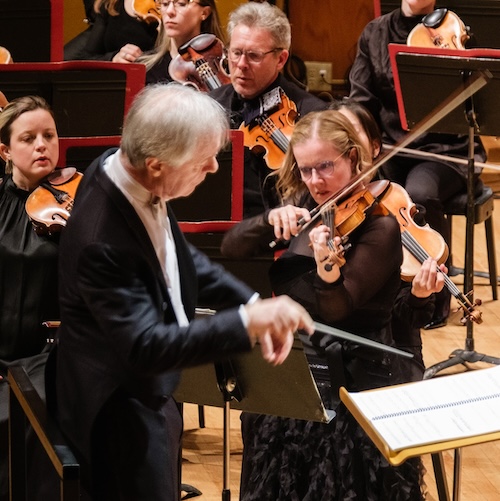Classical Music
Hough returns to Utah Symphony with impassioned Rachmaninoff
Sir Stephen Hough is no stranger to Utah Symphony concertgoers. The […]
Conlon’s mastery makes for memorable Mahler with the Utah Symphony
Thierry Fischer, the Utah Symphony’s music director emeritus, was scheduled to […]
Theater
Critic’s Choice 2025-26
Moravec: The Shining. Utah Opera. October 11–19. Stephen King’s horror classic […]
Concert review
Adkins shines with Adams in Utah Symphony’s American program

David Robertson, the Utah Symphony’s creative partner, led the orchestra in an all-American program Friday night at Abravanel Hall. The program featured works by Christopher Rouse, John Adams, Elliott Carter and Roy Harris, with concertmaster Madeline Adkins soloing in Adams’ Violin Concerto.
Adkins is a marvelous violinist and it’s always a treat to see her in the soloist’s spotlight. Adams’ three-movement concerto is a challenging work. The outer movements in particular demand virtuosic playing and Adkins certainly didn’t disappoint, giving a tour-de-force performance that was stunning in its pyrotechnical displays as well as showcasing her expressive side in the slow middle movement.
In the opening movement, the soloist, playing with only a very few pauses carries the melodic thrust of the music, over a repetitive, static accompaniment. Adkins’ engaging account emphasized the duality of the movement’s structure; she soared over the orchestra in her flights of fluid lyricism. And Robertson never let the orchestra overpower her, allowing the soloist to shine as the dominant voice.
The same is also true for the frenetic third movement, in which the soloist once again carries the brunt of the melodic material. The movement has the character of a perpetual motion, with the soloist again playing almost non-stop. Adkins gave a powerful account, playing with restless energy and relentless drive that gave the music impetus and thrust. And Robertson offered well-defined and articulate accompaniment that supported Adkins wonderfully.
In contrast to the other two movements, the slow middle movement has moments of great beauty and is without question one of Adams’ most inspired creations. Both the soloist and the orchestra are better integrated and create a more unified musical texture, while still allowing the soloist to be in the forefront. Adkins played with infinitely sublime lyricism, capturing the dreaminess of the music with her nuanced and delicately crafted phrasings. Robertson elicited finely expressed playing from the orchestra.
The other major work on the program was Roy Harris’ Symphony No. 3, music with an interesting Utah connection. In 1948, Maurice Abravanel invited Harris to Salt Lake City for a performance of the Third and for a recording of his Fourth Symphony. He and his wife ended up staying in the state until 1949 teaching at what became Utah State University.
This weekend marks only the third time that Harris’s work has been performed by the Utah Symphony (Abravanel also conducted it in 1975.) The work is in five sections played without a break. The music is overwhelmingly tonal and melodic, occasionally reminiscent of Copland but distinctly Harris in its bold, sweeping lines and brassy exuberance.
Robertson coaxed luminous playing from the strings and expansive gestures from the woodwinds and brass. He captured the thoughtful and at times pensive mood of the music in his well-delineated direction. He brought seamless cohesiveness between the sections creating a unified whole and turning the 19-minute symphony into a grand and glorious statement.
Rouse’s radiant Rapture opened the concert. The piece is in effect a gradual accelerando and crescendo that opens quietly and slowly transitions into a boisterous and joyful finale. Robertson captured this transformation with his studied and precise direction and elicited well-articulated playing from the ensemble.
Carter’s Holiday Overture opened the second half of the concert. Written in 1944 after Allied forces liberated Paris, this piece is the composer’s response to this momentous time during the Second World War. The music is unabashedly animated and infused with rhythmic vitality, with Robertson bringing out the piece’s energetic high spirits.
The program will be repeated 7:30 p.m. Saturday. utahsymphony.org
Calendar
February 27
Utah Symphony
Nicholas Carter, conductor
Nelson Goerner, pianist
[…]
Dance
Ballet West creates a moving and magical Neverland in “Peter Pan” premiere
Ballet West escaped to Neverland Friday night with the opening of […]
Ballet West’s “Nutcracker” works its holiday magic once again
Ballet West kicked off the holiday season with (surprise!) The Nutcracker […]


